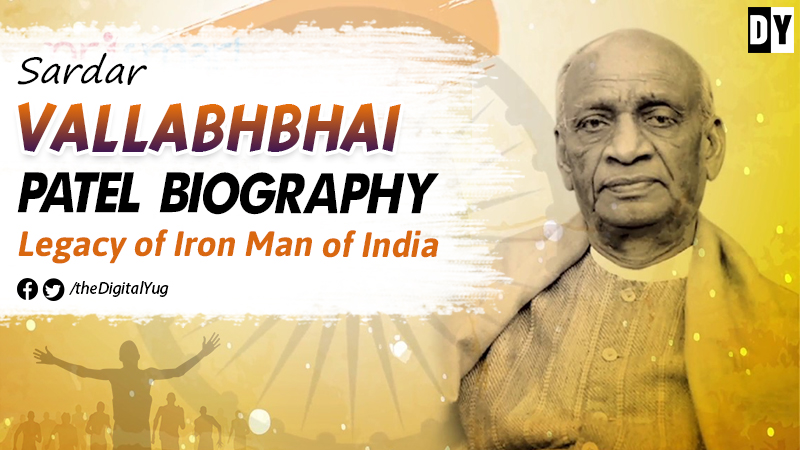


Sardar Vallabhbhai Patel, also known as the "Iron Man of India," played a crucial role in unifying the country after independence. His efforts to integrate over 500 princely states into the Indian Union have left a lasting impact on the nation's integrity. As India celebrates his birth anniversary, let's take a look at the legacy of this great leader who truly earned his title.
Sardar Vallabhbhai Patel: The "Iron Man of India"
Sardar Vallabhbhai Patel, born on October 31, 1875, was a prominent Indian statesman and freedom fighter who played a pivotal role in shaping India's fate after independence.
Background:
Patel was born into a farming family in Nadiad, Gujarat. He trained as a lawyer and returned to India in 1913 after studying in London. During the Indian independence movement, he became a close associate of Mahatma Gandhi and emerged as a key figure in the Indian National Congress.
Role in Unification of India:
One of Patel's most significant contributions was his role in integrating over 500 princely states into the newly formed Indian Union after independence in 1947. Through negotiation, diplomacy, and sometimes military intervention, he successfully brought these states under the control of the Indian government. This process was crucial for the stability and integrity of the young nation.
Iron Man Legacy:
Patel's unwavering determination and ability to achieve his goals earned him the title of "Iron Man of India." He was known for his strong will, decisive action, and pragmatic approach. His leadership during a critical period in India's history helped preserve the country's unity and set it on the path to progress.
Top 5 FAQs:
What is Sardar Patel's full name?
When is Sardar Patel's birthday?
How many princely states did Patel integrate into India?
What is the name of the statue dedicated to Sardar Patel in Gujarat?
What was Patel's role in the Indian independence movement?
Legacy and Remembrance:
Sardar Vallabhbhai Patel's legacy continues to inspire generations of Indians. His vision for a united and strong India remains a cornerstone of the nation's values. Today, countless monuments, institutions, and public spaces bear his name, including the iconic Statue of Unity, the world's tallest statue, built in his honor in Gujarat.

India and the United States have strengthened their already strong ties by signing a 10-year framework for their major defense partnership. The agreement, signed during a bilateral meeting between the two countries' defense ministers, emphasizes the importance of this partnership in maintaining a free and open Indo-Pacific region. This marks a significant step in solidifying the bond between India and the US in the defense sector.

In preparation for a major tri-service military drill, India has issued Notices to Airmen (NOTAM) for the entire northeastern region that borders China, Bhutan, Myanmar, and Bangladesh. The first set of exercises will commence in November and continue through January, signaling enhanced operational readiness for the Indian Air Force (IAF). This move is significant as the Northeast remains a sensitive theater, making up the boundary with four countries, including China. The upcoming IAF exercises aim to strengthen India's air dominance, effectively preparing for any potential challenges along the western frontier with Pakistan.

India will conduct a 10-day military exercise in Rajasthan and Gujarat involving the Army, Air Force, and Navy to showcase its operational readiness following Operation Sindoor earlier this year. The exercise, announced through a NOTAM, features advanced military technologies and emphasises the integration of speed, firepower, and precision in desert warfare conditions. It comes amidst heightened tensions with Pakistan and a renewed focus on maintaining military readiness along the border.

Jammu and Kashmir police have filed an FIR against a group of Christian missionaries in Kathua district for allegedly attempting religious conversions through financial incentives. This comes after a video surfaced online showing the missionaries being attacked and their vehicle vandalized by villagers. The incident has sparked outrage and protests from local Hindu groups, demanding action against the accused missionaries. One accused, Ravindra Singh Thela, has been arrested while the main accused, Vivek Soni, is still at large. The police have also suspended eight personnel for failing to stop the attack.

US Vice President JD Vance, who converted to Catholicism in 2019, has revealed that he hopes his Hindu-raised wife, Usha Vance, will eventually embrace Christianity. However, he clarifies that their interfaith marriage is built on mutual respect and understanding, and that Usha has complete freedom of choice in matters of faith. The couple has found a balanced way to manage their interfaith household, with their children attending a Christian school and given the choice to be baptized.

US President Donald Trump has expressed optimism about reaching a trade deal with China "pretty soon" after a meeting with Chinese President Xi Jinping in South Korea. In addition to announcing lower tariffs on Chinese imports, Trump also stated that the issue over US access to rare earths has been resolved. However, there has been no official response from Beijing and the final decision on the sale of Chinese-owned TikTok's US operations is still pending. Analysts see these developments as a breakthrough in the ongoing trade tensions between the two countries. Our correspondents provide insight on the discussions between the two leaders and speculate on why Xi may have felt confident walking into the meeting.

At the Asia-Pacific Economic Cooperation (APEC) Summit in South Korea, Chinese President Xi Jinping and US President Donald Trump met for their first in-person talks in several years. Despite past frictions, Xi called for closer cooperation between the two largest economies in the world, emphasizing the importance of being "partners and friends." Acknowledging Trump's peace efforts in the Middle East, Xi commended his contributions and praised him as a "tough negotiator." Trump also expressed optimism for a productive discussion on trade and global security.

In a historic event, Prime Minister Shri Narendra Modi addressed the Global Maritime Leaders Conclave and chaired the Global Maritime CEO Forum at India Maritime Week 2025 in Mumbai, welcoming participants from over 85 countries. With major shipping giants, startups, policymakers, and innovators in attendance, the summit showcased India's advancements in the maritime sector, such as the replacement of outdated colonial laws with modern ones and the recognition of large ships as infrastructure assets. Amidst global tensions, India stands as a symbol of strategic autonomy and inclusive growth, ready to take on a leading role in the world's rough seas.

Indian Prime Minister Narendra Modi has declared that the next generation of Goods and Services Tax (GST) reforms will begin on the first day of the Navratri festival. This major economic overhaul aims to streamline the current GST system and support businesses, especially small and medium enterprises. In other news, the National Human Rights Commission (NHRC) and Ministry of External Affairs (MEA) are collaborating to organize a six-day program in New Delhi to strengthen executive capacity for International Technical and Economic Cooperation (ITEC). Lastly, the upcoming BIRC 2025 conference will take place at the Bharat Mandapam in New Delhi.

Indian Prime Minister Narendra Modi is set to address the Global Maritime CEO Forum and Maritime Leaders Conclave at India Maritime Week (IMW) 2025 in Mumbai on Wednesday. The event will bring together global maritime leaders, investors, policymakers, and innovators to discuss sustainable growth and inclusive blue economy strategies, showcasing India's efforts towards becoming a leading maritime power. With the theme 'Uniting Oceans, One Maritime Vision' and participation from over 85 countries, the event will highlight India's commitment towards maritime sustainability and climate responsibility.